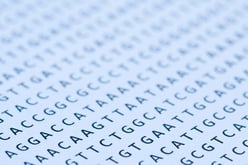Originally published : Wed, June 13, 2018 @ 4:37 PM

Updated : Thu, June 28, 2018 @ 4:28 PM
Imagine a time capsule the size of a shoebox that holds all the information currently on the internet that can be stored and accessed for hundreds and thousands of years 1. Sound like a scene straight out of a science fiction novel set in the year 3000? It’s not. Scientists are already working on cracking the code – binary code that is. DNA, is analogous to the binary code on your computer, so why not treat it as such?
Scientists from the University of Washington and Microsoft have begun work trying to figure out how the nucleotides that make-up DNA can be used to store large amounts of data. The project involves an intricate way to encode, store, and retrieve DNA data. Images, songs, and videos are all encoded as a string of 0’s and 1’s. These 0’s and 1’s are then converted into a string of A’s, C’s, G’s and T’s - the bases that pair to form a DNA (Adenine, Cytosine, Guanine, and Thymine)2. A DNA molecule with that sequence is then chemically synthesized and dried out for storing. DNA is a highly dense material, one gram can store 215 gigabytes of information. When dried down and stored in a cool dark place DNA can last indefinitely3.
You may be asking yourself: With all the data centers and cloud technology that already exists, why DNA? Why are we trying to reinvent the wheel?
With a growing population and an increasing need to store our data, the cost incurred by sustaining our current infrastructure is astronomical considering the land use and the energy consumed to keep data facilities running. A recent paper published by research group IDC, forecasts a “ten-fold increase in worldwide data by 2015” – predicting 163 zettabytes of data a year. The existing cloud storage spaces will grow well beyond previous expectations, and there will need to be plans in place on how data is collected, utilized and where it’s stored. There is a huge need for robust and durable data storage devices that can be used to store long-term data. When dried down and stored in a cool place DNA could, in theory, last indefinitely and store massive amounts of data 4.
Unlike photos, tapes, or hard drives which can degrade over time, DNA can serve as a capsule that withstands the test of time. So, if you want to preserve your family’s memories for years and years to come, encoding them into DNA is the way to go – but it’s not going to be cheap. Right now the cost to get 2 megabytes of information synthesized is estimated to be $7,000 and another $2,000 to read it 3 .
While currently the cost to encode DNA is astronomical and the time it takes to retrieve the information is far too long to be a scalable solution for large data storage, that doesn’t mean it couldn’t happen in the future. Costs are continually decreasing to synthesize and sequence DNA – so who knows, maybe one day you’ll be reaching for DNA to show off your photos to the grandkids.
1. Bear-McGuinness, L. (n.d.). Is DNA the future of data storage? Retrieved from https://ed.ted.com/lessons/is-dna-the-future-of-data-storage-leo-bear-mcguinness
2. Synthetic double-helix faithfully stores Shakespeare's sonnets. (n.d.). Retrieved from https://www.nature.com/news/synthetic-double-helix-faithfully-stores-shakespeare-s-sonnets-1.12279
3. ServiceMar, R. F., MervisJun, J., Wittenberg, A., NewsJun, E., WadmanJun, M., MalakoffJun, D., & CleryJun, D. (2017, December 08). DNA could store all of the world's data in one room. Retrieved from http://www.sciencemag.org/news/2017/03/dna-could-store-all-worlds-data-one-room
4. Organick, L., Ang, S. D., Chen, Y., Lopez, R., Yekhanin, S., Makarychev, K., . . . Strauss, K. (2018, February 19). Random access in large-scale DNA data storage. Retrieved from https://www.nature.com/articles/nbt.4079

